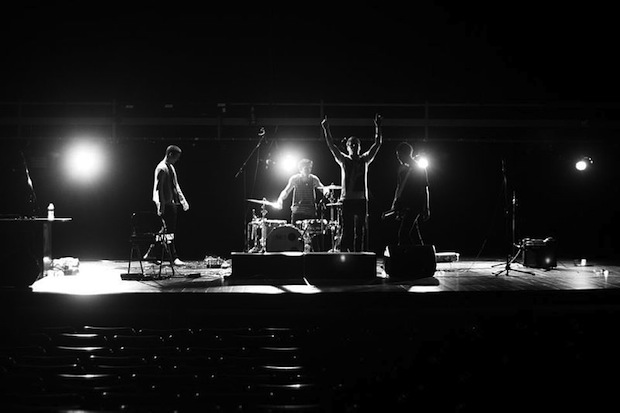 HIGHSOCIETY (Image via Wikipedia Commons)
HIGHSOCIETY (Image via Wikipedia Commons)
Ever find yourself scrambling last minute to get things done before a recording session? The stakes are high, and tensions can rise when rehearsing for an upcoming record where the sounds you create are committed to tape. The following six tips will help guide you, offering detailed advice on how to schedule in advance, manage session players, work collaboratively on arrangements and songwriting, and maximize time in those expensive rehearsal spaces and subsequent recording facilities.
1. Pre-production
There are too many artists who trivialize this initial stage of the recording process. Whether you're working with a producer or your band is improvising along the way, pre-production is arguably the most crucial element in determining your success in the studio. If you're struggling to justify utilizing a producer, this phase will determine how valuable a producer is to your project as an integral part of the rehearsal process.
This is the part where you break down your material to its skeletal form, analyzing everything from tempo, artistic intent, lyrical content, melodic contour, rhythmic direction, stylistic interpretation, harmonic structure, song form, emotional climax, to pinpointing your target audience. This is also where you formalize demos for musicians you're working with to conceptualize an arrangement. This is key if you're a small band looking to contract outside session players to add instrumentation you lack.
2. Stick to a schedule
Artists often find it difficult to consider a song finished. While this is understandable, if you’re rehearsing in advance of a previously booked recording session, you must set a deadline for your works of art to be completed. Having a producer or trusted outside ear can be invaluable in determining this, because he or she will listen objectively and be able to sense when enough is enough. You can always make improvements along the way, but as a creative artist, you need context and structure to efficiently deliver a product. Nothing creates stress and tension like trying to rewrite a bridge an hour before a recording session is about to begin.
[8 Simple Ways to Make Your Band Rehearsals More Productive]
3. Setup
While it's important for bands to emulate their unique stage setup while rehearsing for an upcoming show, in studio recording, this isn't the case. When you have a live audience of fans in front of you, you have the advantage of your energy being immediately acknowledged and reciprocated. In the studio, however, the energy you create has to be present but also restrained, keeping in mind the potential for a single person to be listening to your songs alone in his or her bedroom.
In the early stages of rehearsing, it's crucial to have every musician in the room in clear sight of each other to increase the level of sensitivity and response. You want visual cues to synchronize the energy in the room and allow for fluid lines of nonverbal communication, because musicians perform with their bodies. Magical ideas can surface when players are positioned in an intimate fashion that facilitates a natural human connection through music. Studio recording is vastly different than onstage performances, and the rehearsal environment should mirror that contrast.
4. Layer instrumentation gradually
When deciding on adding players and parts, it's unquestionable that intention is your guiding compass. There's something to be said for creating intriguing sounds and developing unique textures to enhance an aesthetic vibe, but you must first define your intent so that your instrumentation has a clear purpose. Music is storytelling, and instruments are there to translate ideas into parts.
The best approach when rehearsing is to plan manageable, incremental stages of instrumentation (e.g., establishing rhythm section grooves, supporting strings, supporting winds/brass, harmonic versus melodic lines, and lastly atmospheric soundscapes). Add one player at a time, ensuring that every part has a specific purpose, and no one player is fighting for auditory space over another.
5. Record your progress
Even if it's just with an iPhone or USB mic, it's really helpful to track how your songs evolve during the rehearsal process and to always have a reference on hand. Nothing's worse than having a drummer play an awesome groove during rehearsal that fits perfectly within the framework of a song, only to later forget the rhythms and discover that no one captured that moment to refer back to.
Additionally, sometimes bands get lost when trying out different versions of songs and eventually find that they want to simplify and return to how a song started. Having a recording of each part every step of the way makes this process much easier.
6. Seek honest feedback
We all strive to embody the purest definition of artists – where we create just because we're inspired, wholly uninhibited by the need for external validation. While this is a noble endeavor, the realities of rent, loans, and car payments accruing interest make it nearly impossible to ignore the marketing considerations for the music we create. This is why it's helpful to have a widely varied network of listeners (or educated producers) familiar with the genre neighborhood you live in to give you feedback in preparation of a studio recording.
If your schedule allows, test out your rehearsed material in front of live audiences to gauge how people are responding. This is the best way to preview how your album will perform. Transparent truth isn't always easy to handle, but it's extremely useful in creating a product that can realistically compete within the commercial marketplace.
Caleb Hsu is an independent vocal producer and freelance recording engineer based in Los Angeles. As a classically trained pianist and composer, he enjoys writing music technology features that combine his psychology background with current industry trends.

